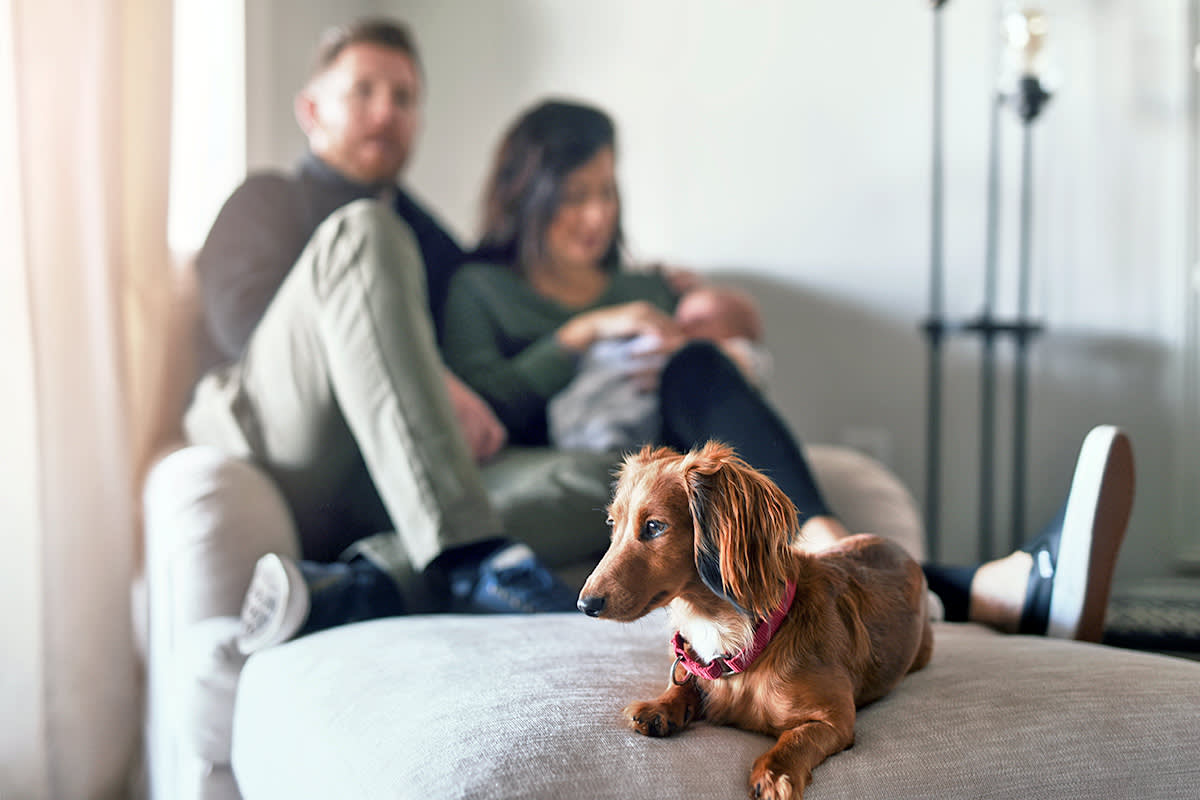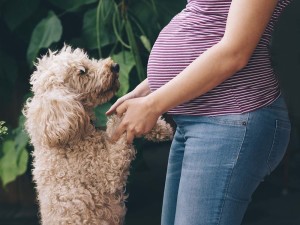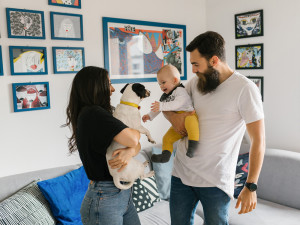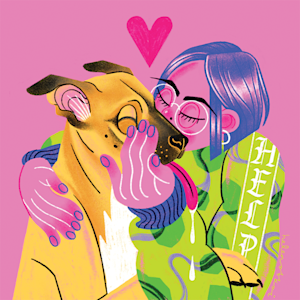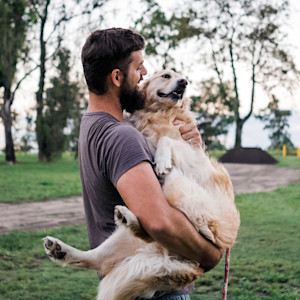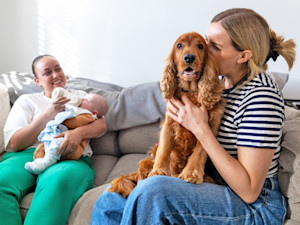I Was Scared of ‘Postpartum Pet Aversion’—But My Dog Actually Soothed My Baby Blues
Feeling differently about your pet (and yourself) after you have a child is super common.
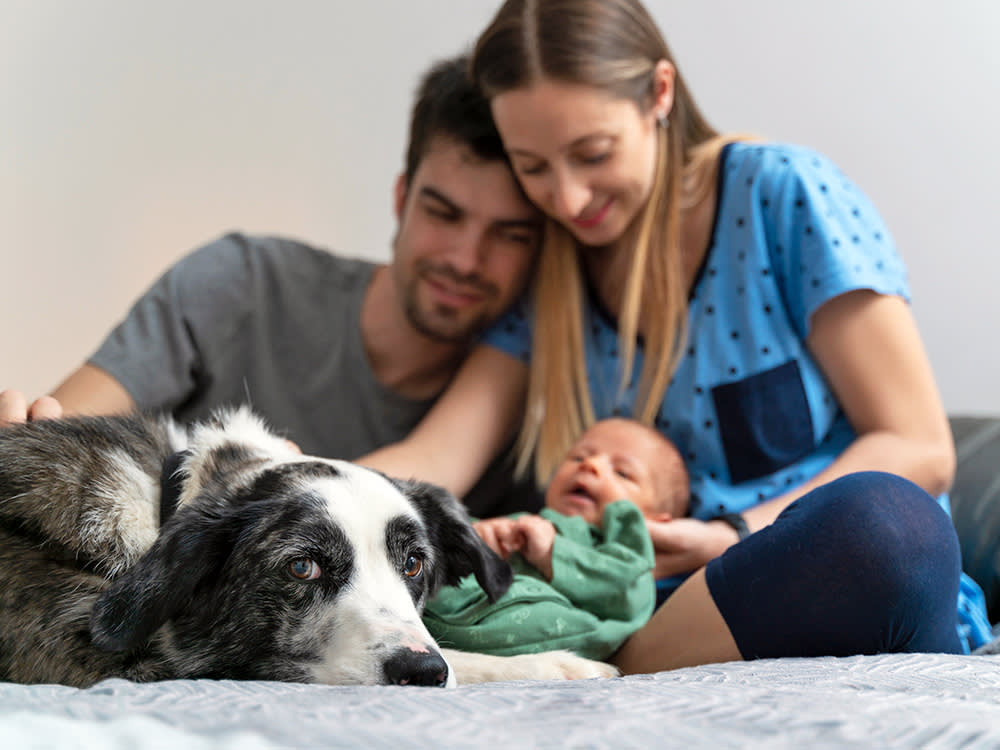
Share Article
I was worried about many things before having a baby, from the minutiae of how many onesies I’d need (a lot) to the existential question of how motherhood would change my very identity (a lot). But one of my top concerns — and one many people in my life either laughed at or didn’t understand — was how my dog would react to his new sister.
Baloo, my five-year-old Poodle mix, has always reacted poorly to kids. My husband and I (inconveniently for Baloo) live across the street from a middle school, where students have recess in the park where we take our afternoon walks. Should any preteen try to bend down to pet Baloo, he either dramatically skitters away or barks. Very small children elicit a worse reaction: He seems to consider them something between human and demon and does all he can to avoid any he comes in contact with.
Given these reactions, I think my concern makes sense. But I was so worried about how my dog would react to my baby that, for a long time, I didn’t think about how I might react to my dog as I was going through this big change.
Then, one day, while scrolling through Instagram one day in my third trimester, I came across a post about postpartum pet aversion, or the phenomenon of new parents feeling frustrated or even disgusted by their pets after having a baby. It turns out, this experience isn’t an anomaly: A 2024 ManyPets surveyopens in new tab found that 34 percent of new parents reported “moments of annoyance or frustration” with their dogs.

Postpartum pet aversion is a real thing—and I was terrified of it.
This is something Dominika Knossalla-Pado, founder of Dog Meets Babyopens in new tab, has found in her work. “Every time I post about grief, guilt, or resentment toward the family dog after bringing a baby home, that post is shared widely and commented on a lot,” Knossalla-Pado tells me. “In fact, our last carousel Instagram post about grief opens in new tab went viral and had over three million views.”
But why do so many new parents experience postpartum pet aversion? “When you are busy taking care of the newborn, too tired, too sleep-deprived, and often too touched-out to spend time with the dog, many normal dog behaviors become irritating,” Knossalla-Pado says. “The shedding, the barking, the licking, asking for pets becomes too much. Your dog staring at you lovingly may feel like judging.”
Becoming a parent is a big shift in identity for most people, and especially for those who “don’t have much help, or [have a baby with medical problems] or are simply exhausted, those feelings of resentment towards your dog can get amplified,” Knossalla-Pado adds.
Many parents may also experience postpartum pet aversion in response to their dog’s changed behavior around the baby, not just their own feelings. The ManyPets surveyopens in new tab found that 97 percent of respondents reported that their dog’s behavior shifted after the arrival of a baby.
“Many dogs change their behavior during mom’s pregnancy; some become very clingy and protective of the pregnant mom, spending a lot of time by her side,” per Knossalla-Pado. “When it abruptly ends, some dogs start ‘acting out,’ right when you don’t have time, energy, and patience for these new behaviors.”
Luckily, there are steps expecting parents can take to prepare their dog for their new family member. They can plan ahead by intentionally spending time away from their dog every day (even if just in a separate room where the dog does not have access). They can train their dog to go to their bed and stay there and to not climb into their parent’s lap as soon as they sit down, Knossalla-Pado says.
Parents can also make a plan for their dog upon their baby’s arrival, including asking neighbors, friends, or family members to help with the dog or hiring a dog walker.
You can only prep so much for the unexpected — so give yourself a big pass.
Thankfully, there is still hope for parents who did not prepare ahead of time and are experiencing postpartum pet aversion.
“The first step is to normalize the feeling,” Knossalla-Pado says. “You are not a bad dog parent. Your world has changed, you are learning something new every day, you are tired and overstimulated. Give yourself grace.”
I was one of those pet parents who admittedly did very little to prepare my dog for my baby’s arrival. And on the afternoon my husband and I left the hospital with our newborn, I began to cry — in part because we were leaving the care of nurses who handled my daughter with far more confidence than I did. But a much bigger part of me was upset because we were about to introduce Baloo to his new sister and I was terrified of a worst case scenario in which he outright rejected her.
Thankfully, I didn’t need to worry. Baloo greeted our daughter with a curious sniff, then turned to my husband and me, immediately disinterested in her and overjoyed to see his parents again after a few long days apart.
Not only did I not need to worry, but Baloo ended up being a godsend during what turned out to be a very difficult transition to new parenthood. I quickly began to experience postpartum depression. I found myself crying uncontrollably around the clock due to sleep deprivation, my body readjusting to my pregnancy break from my normal dose of antidepressants, the natural hormonal crash that follows birth, and, of course, the unbelievably overwhelming and consuming experience that is taking care of a newborn.
And when you can, be super thankful for your pet.
When all I could do was hand the baby over to my husband or very supportive parents and parents-in-law and cry in bed, Baloo was there. He curled up next to me and radiated comforting warmth. He didn’t need me to talk about what I was feeling, and I couldn’t; everything felt inexplicable and overwhelming and impossible to put into words. He was just there for me, the embodiment of pure love.
While postpartum pet aversion is common, this experience — of a pet alleviating symptoms of postpartum depression — can be just as likely. One 2022 study foundopens in new tab that having a dog was associated with a reduced risk of depressive symptoms postpartum.
Ultimately, like everything related to postpartum, every person’s experience is unique and unknowable before it happens, including how your hormones can wreck your body and mind and turn you into a stranger to yourself in every way, including your identity as a dog parent. And should anyone reading this experience postpartum pet aversion, please know you’re not alone.
“Those feelings are often temporary and once you find your groove, the baby starts sleeping longer stretches, and you have more energy, you will likely see your dog in a different light,” Knossalla-Pado confirms.
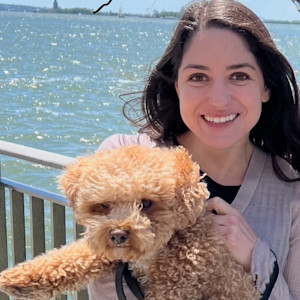
Julie Zeilinger
Julie Zeilinger is a writer and editor whose writing has been published in Marie Claire, Forbes, Vox, HuffPost, and other publications. She is also the author of two books: College 101: A Girl’s Guide to Freshman Year (2014) and A Little F’d Up: Why Feminism Is Not a Dirty Word (2012). She has a two-year-old Bichpoo named Baloo and is a foster mom to dogs via Badass Animal Rescue.
Related articles
![Pregnant woman and her dog playing in the park.]()
How Dogs React to Pregnant Women
Why pups' behavior may change when you’re expecting.
![A woman holding her dog and introducing it to a baby in the arms of a bearded man in a white t-shirt and jeans, in the living room]()
Safety Tips for Living with Babies and Dogs In Healthy Harmony
Handling a houseful of love.
![]()
Parenting a Dog Isn’t So Different From Raising a Kid, After All
OK, OK, don’t come for us. We know dogs and kids are very different to raise, but this study finds they respond to different parenting styles in similar ways.
![Man holds his Labrador dog in his arms outside.]()
You Raise Your Dog the Way Your Parents Raised You, New Study Finds
One more thing to talk about with your therapist.
![Two friends hanging out with their baby and dog at home.]()
Are Dog Moms ‘Real’ Moms? Not Everyone Thinks So
Even as more people choose to have pets over kids, they are often still met with criticism.
